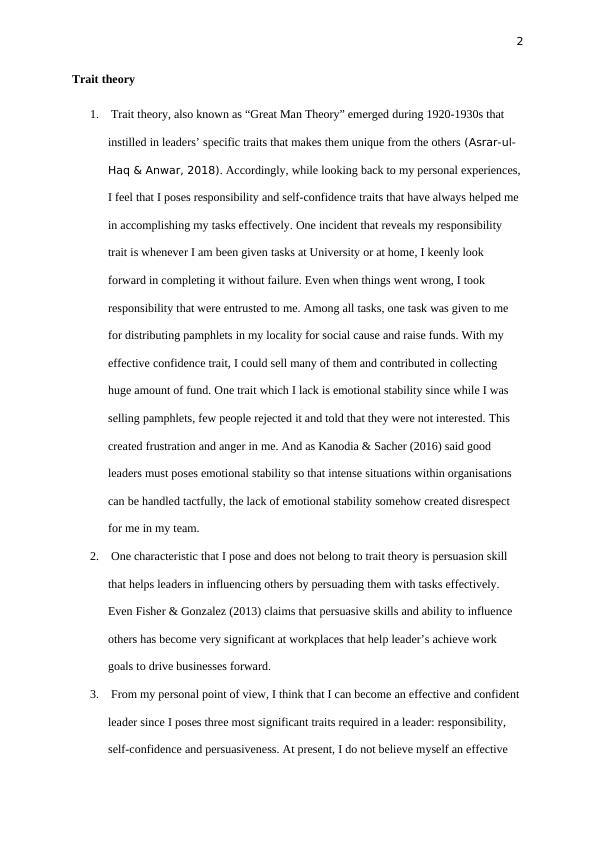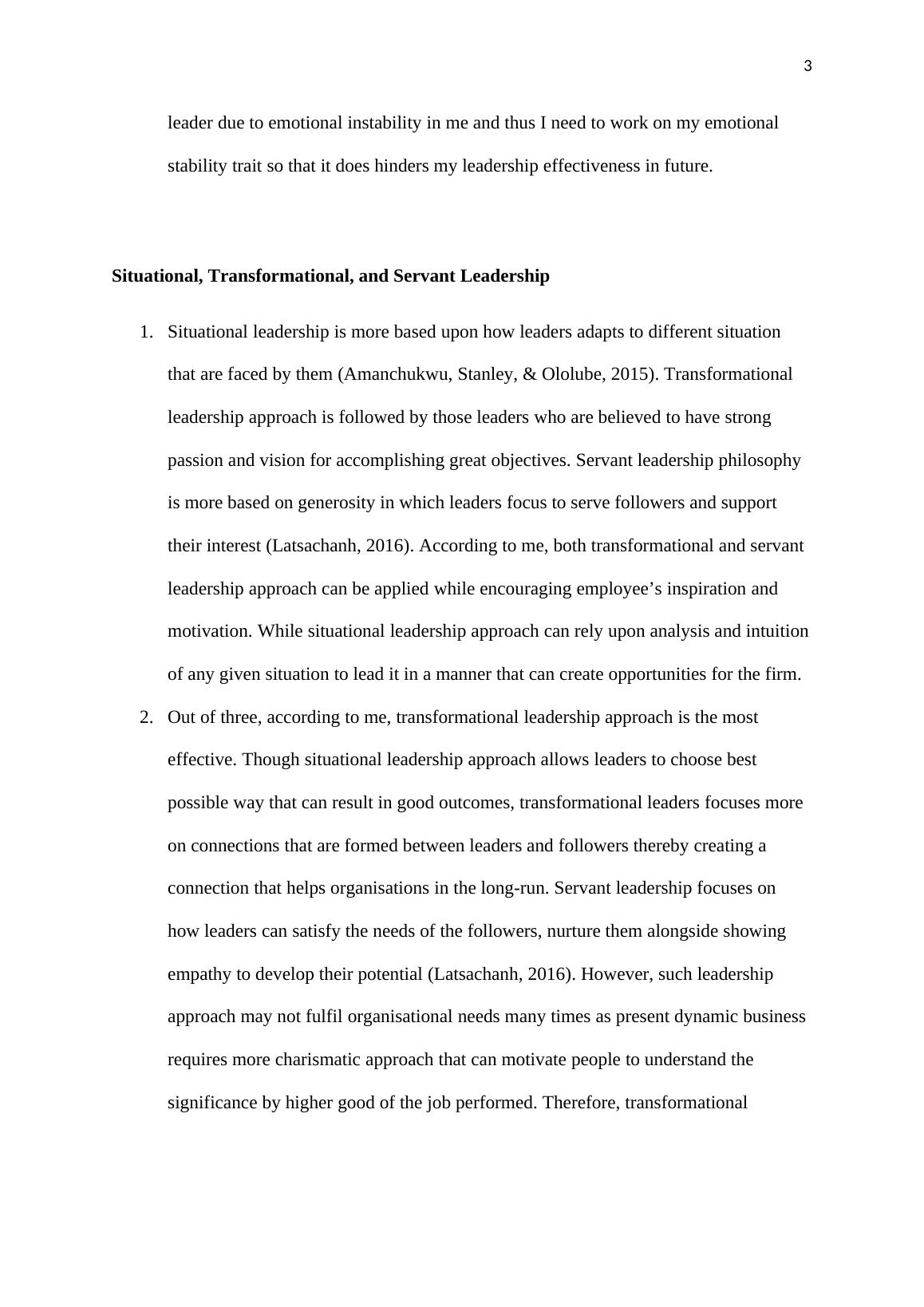Leadership Theories and Approaches
Added on 2022-12-30
9 Pages2187 Words2 Views
1
Student Name:
Institutional Affiliation(S):
Course Tile:
Due Date:
Student Name:
Institutional Affiliation(S):
Course Tile:
Due Date:

2
Trait theory
1. Trait theory, also known as “Great Man Theory” emerged during 1920-1930s that
instilled in leaders’ specific traits that makes them unique from the others (Asrar-ul-
Haq & Anwar, 2018). Accordingly, while looking back to my personal experiences,
I feel that I poses responsibility and self-confidence traits that have always helped me
in accomplishing my tasks effectively. One incident that reveals my responsibility
trait is whenever I am been given tasks at University or at home, I keenly look
forward in completing it without failure. Even when things went wrong, I took
responsibility that were entrusted to me. Among all tasks, one task was given to me
for distributing pamphlets in my locality for social cause and raise funds. With my
effective confidence trait, I could sell many of them and contributed in collecting
huge amount of fund. One trait which I lack is emotional stability since while I was
selling pamphlets, few people rejected it and told that they were not interested. This
created frustration and anger in me. And as Kanodia & Sacher (2016) said good
leaders must poses emotional stability so that intense situations within organisations
can be handled tactfully, the lack of emotional stability somehow created disrespect
for me in my team.
2. One characteristic that I pose and does not belong to trait theory is persuasion skill
that helps leaders in influencing others by persuading them with tasks effectively.
Even Fisher & Gonzalez (2013) claims that persuasive skills and ability to influence
others has become very significant at workplaces that help leader’s achieve work
goals to drive businesses forward.
3. From my personal point of view, I think that I can become an effective and confident
leader since I poses three most significant traits required in a leader: responsibility,
self-confidence and persuasiveness. At present, I do not believe myself an effective
Trait theory
1. Trait theory, also known as “Great Man Theory” emerged during 1920-1930s that
instilled in leaders’ specific traits that makes them unique from the others (Asrar-ul-
Haq & Anwar, 2018). Accordingly, while looking back to my personal experiences,
I feel that I poses responsibility and self-confidence traits that have always helped me
in accomplishing my tasks effectively. One incident that reveals my responsibility
trait is whenever I am been given tasks at University or at home, I keenly look
forward in completing it without failure. Even when things went wrong, I took
responsibility that were entrusted to me. Among all tasks, one task was given to me
for distributing pamphlets in my locality for social cause and raise funds. With my
effective confidence trait, I could sell many of them and contributed in collecting
huge amount of fund. One trait which I lack is emotional stability since while I was
selling pamphlets, few people rejected it and told that they were not interested. This
created frustration and anger in me. And as Kanodia & Sacher (2016) said good
leaders must poses emotional stability so that intense situations within organisations
can be handled tactfully, the lack of emotional stability somehow created disrespect
for me in my team.
2. One characteristic that I pose and does not belong to trait theory is persuasion skill
that helps leaders in influencing others by persuading them with tasks effectively.
Even Fisher & Gonzalez (2013) claims that persuasive skills and ability to influence
others has become very significant at workplaces that help leader’s achieve work
goals to drive businesses forward.
3. From my personal point of view, I think that I can become an effective and confident
leader since I poses three most significant traits required in a leader: responsibility,
self-confidence and persuasiveness. At present, I do not believe myself an effective

3
leader due to emotional instability in me and thus I need to work on my emotional
stability trait so that it does hinders my leadership effectiveness in future.
Situational, Transformational, and Servant Leadership
1. Situational leadership is more based upon how leaders adapts to different situation
that are faced by them (Amanchukwu, Stanley, & Ololube, 2015).
Transformational leadership approach is followed by those leaders who are believed
to have strong passion and vision for accomplishing great objectives. Servant
leadership philosophy is more based on generosity in which leaders focus to serve
followers and support their interest (Latsachanh, 2016). According to me, both
transformational and servant leadership approach can be applied while encouraging
employee’s inspiration and motivation. While situational leadership approach can rely
upon analysis and intuition of any given situation to lead it in a manner that can create
opportunities for the firm.
2. Out of three, according to me, transformational leadership approach is the most
effective. Though situational leadership approach allows leaders to choose best
possible way that can result in good outcomes, transformational leaders focuses more
on connections that are formed between leaders and followers thereby creating a
connection that helps organisations in the long-run. Servant leadership focuses on
how leaders can satisfy the needs of the followers, nurture them alongside showing
empathy to develop their potential (Latsachanh, 2016). However, such leadership
approach may not fulfil organisational needs many times as present dynamic business
requires more charismatic approach that can motivate people to understand the
significance by higher good of the job performed. Therefore, transformational
leader due to emotional instability in me and thus I need to work on my emotional
stability trait so that it does hinders my leadership effectiveness in future.
Situational, Transformational, and Servant Leadership
1. Situational leadership is more based upon how leaders adapts to different situation
that are faced by them (Amanchukwu, Stanley, & Ololube, 2015).
Transformational leadership approach is followed by those leaders who are believed
to have strong passion and vision for accomplishing great objectives. Servant
leadership philosophy is more based on generosity in which leaders focus to serve
followers and support their interest (Latsachanh, 2016). According to me, both
transformational and servant leadership approach can be applied while encouraging
employee’s inspiration and motivation. While situational leadership approach can rely
upon analysis and intuition of any given situation to lead it in a manner that can create
opportunities for the firm.
2. Out of three, according to me, transformational leadership approach is the most
effective. Though situational leadership approach allows leaders to choose best
possible way that can result in good outcomes, transformational leaders focuses more
on connections that are formed between leaders and followers thereby creating a
connection that helps organisations in the long-run. Servant leadership focuses on
how leaders can satisfy the needs of the followers, nurture them alongside showing
empathy to develop their potential (Latsachanh, 2016). However, such leadership
approach may not fulfil organisational needs many times as present dynamic business
requires more charismatic approach that can motivate people to understand the
significance by higher good of the job performed. Therefore, transformational

End of preview
Want to access all the pages? Upload your documents or become a member.
Related Documents
What is purpose of understand a conceptlg...
|8
|2035
|15
Journal of Education and Learninglg...
|8
|2050
|12
Introduction to Management: Traits of Effective Leaders and Leadership Theorieslg...
|12
|2657
|84
Leadership Management Profilelg...
|10
|1775
|230
Introduction of leadershiplg...
|11
|2444
|404
Leadership Management Profile Project Assignmentlg...
|9
|2365
|44
